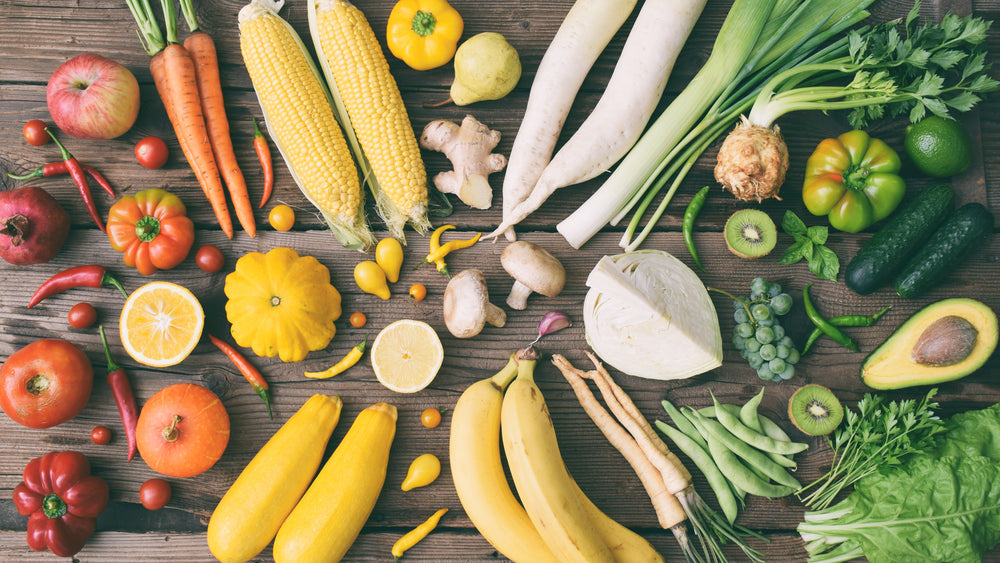Envie d'une meilleure digestion ? Un gastro-entérologue vous explique comment y parvenir.

En tant que gastro-entérologue, le Dr B. connaît bien l'amélioration de la digestion. Dans la dernière partie de notre série « Demandez au Dr B, médecin spécialiste de la santé intestinale », il partage ses 5 meilleurs conseils pour améliorer la digestion.
Au quotidien, dans mon cabinet de gastroentérologie, je prends soin des intestins des personnes souffrant de troubles digestifs. Chacun mérite de savourer sa nourriture, mais c'est quasiment impossible si l'on souffre de ballonnements, de sensation de satiété excessive, d'inconfort, de diarrhée ou de constipation après les repas. Malheureusement, il n'existe pas de solution miracle pour améliorer la fonction digestive, ni de solution miracle. Mais des mesures simples d'hygiène de vie peuvent faire toute la différence pour que vos intestins se remettent à chanter et à danser après un repas au lieu de pleurer et de se plaindre. Voici 5 conseils simples pour améliorer votre fonction digestive :
Le meilleur indicateur d'une bonne santé intestinale est la diversité des végétaux que vous consommez [i] . Dans cette optique, chaque fois que vous mettez les pieds au supermarché, vous devriez parcourir avec enthousiasme les rayons fruits et légumes à la recherche d'un nouveau fruit ou légume frais à ajouter à votre alimentation. À chaque fois que vous vous asseyez pour manger, vous devriez vous demander : « Comment puis-je ajouter plus de variété végétale à ce plat ? » Une simple pincée d'herbes ou d'épices, un soupçon d'agrumes ou une garniture de carottes et de céleri peuvent aider. Sans oublier les superaliments intestinaux fermentés biologiques+ de Genuine Health, qui contiennent 22 superaliments fermentés biologiques dans un mélange en poudre. Leur utilisation ne devrait pas modifier votre approche visant à maximiser la diversité végétale à chaque repas, mais elle offre une base solide pour favoriser une bonne santé intestinale.
Vous avez probablement entendu parler des FODMAP , acronyme signifiant « oligosaccharides, disaccharides, monosaccharides et polyols fermentescibles ». Il s'agit essentiellement des composants de nos aliments susceptibles de provoquer des gaz ou des troubles digestifs. Le lactose, présent dans les produits laitiers, en est un exemple. Que vous soyez intolérant ou non au lactose, boire suffisamment de lait va forcément perturber votre intestin. C'est dans cet esprit que le régime pauvre en FODMAP a été développé pour identifier les déclencheurs alimentaires et les modérer. Cette approche s'est avérée bénéfique pour les patients atteints du syndrome du côlon irritable [ii] . Parallèlement, l'élimination définitive d'aliments par ce régime peut également endommager le microbiome [iii] . N'oubliez pas que le meilleur indicateur d'une bonne santé intestinale est la diversité des végétaux que vous consommez. Par conséquent, je recommande de ne pas éliminer d'aliments, mais de prendre conscience de leur teneur en FODMAP pour identifier les déclencheurs alimentaires et modérer la taille des portions.
Votre corps a un rythme naturel conçu pour fonctionner de manière optimale à certains moments de la journée et sous-optimale à d'autres. Par exemple, vous êtes plus sensible à l'insuline le matin et moins sensible tard le soir [iv] . Consommer exactement le même aliment, mais à un autre moment de la journée, peut entraîner une réponse différente. Grignoter tard le soir sollicite votre intestin alors qu'il a besoin de repos. Dans cette optique, je vous recommande de dîner le plus tôt possible. 18 h, ça vous semble tôt ? Ce serait encore mieux si c'était 17 h ! Ce faisant, je vous demande de vous engager à ce que le dîner soit le dernier repas de la journée, et ensuite de vous limiter à boire de l'eau.
Un probiotique, par définition, est un micro-organisme vivant dont les bienfaits pour la santé sont démontrés. En prenant un probiotique, vous ne remplacez pas, mais augmentez temporairement les fonctions vitales de votre intestin. Des études ont montré que la prise de probiotiques peut favoriser la réduction des ballonnements et l'amélioration du syndrome du côlon irritable [v] . Comme je l'ai mentionné dans mon article sur les probiotiques pour les intolérances alimentaires, je suis convaincu que le probiotique avancé pour la santé intestinale de Genuine Health répond à tous les critères d'un probiotique de haute qualité.
La chose la plus simple, et pourtant la plus négligée, à faire pour notre santé est peut-être de boire plus d'eau. Malheureusement, la plupart d'entre nous passent trop de temps à siroter de la caféine le matin, ce qui ne fait qu'aggraver notre déshydratation. Avez-vous déjà remarqué des lèvres sèches et gercées ou une bouche pâteuse le matin ? C'est parce que nous ne buvons pas assez d'eau. C'est pourquoi j'ai adopté il y a plus d'un an une approche qui a boosté mon énergie et ma clarté d'esprit, et c'est incroyablement simple. L'eau est désormais ma boisson de prédilection tout au long de la journée. J'apprécie toujours mon café, mais ma première chose à faire le matin est de boire deux grands verres d'eau. Ensuite, pendant que je savoure mon café, si je sens que les lèvres gercées ou la bouche pâteuse commencent à apparaître, je pose ma tasse et prends la bouteille d'eau. Petit-déjeuner, déjeuner et dîner sont autant d'occasions d'oublier les boissons sucrées et d'opter pour de l'eau, éventuellement arrosée d'un filet de citron.
Merci d'avoir lu notre série « Demandez au Dr B », The Gut Health MD. Si vous avez manqué certains articles informatifs du Dr B, les voici :
À LIRE : Un gastro-entérologue s'attaque à la principale cause de gaz et de ballonnements dans sa clinique
À LIRE : Les FODMAP expliqués par un gastro-entérologue
À LIRE : Les probiotiques peuvent-ils aider à soulager les intolérances alimentaires ? Un gastro-entérologue donne son avis.
Sources :
[i] mSystems mai 2018, 3 (3) e00031-18.
[ii] Nutriments . 2017 sept.; 9(9): 940.
[iii] J Nutr. 2012 août; 142(8):1510-8.; Gut. 2015 janv.; 64(1):93-100
[iv] FASEB J. 2016 sept.;30(9):3117-23.
[v] Gastroentérol Hépatol (NY) . janvier 2010 ; 6(1) : 39-44.
Au quotidien, dans mon cabinet de gastroentérologie, je prends soin des intestins des personnes souffrant de troubles digestifs. Chacun mérite de savourer sa nourriture, mais c'est quasiment impossible si l'on souffre de ballonnements, de sensation de satiété excessive, d'inconfort, de diarrhée ou de constipation après les repas. Malheureusement, il n'existe pas de solution miracle pour améliorer la fonction digestive, ni de solution miracle. Mais des mesures simples d'hygiène de vie peuvent faire toute la différence pour que vos intestins se remettent à chanter et à danser après un repas au lieu de pleurer et de se plaindre. Voici 5 conseils simples pour améliorer votre fonction digestive :
Maximiser la diversité végétale.
Le meilleur indicateur d'une bonne santé intestinale est la diversité des végétaux que vous consommez [i] . Dans cette optique, chaque fois que vous mettez les pieds au supermarché, vous devriez parcourir avec enthousiasme les rayons fruits et légumes à la recherche d'un nouveau fruit ou légume frais à ajouter à votre alimentation. À chaque fois que vous vous asseyez pour manger, vous devriez vous demander : « Comment puis-je ajouter plus de variété végétale à ce plat ? » Une simple pincée d'herbes ou d'épices, un soupçon d'agrumes ou une garniture de carottes et de céleri peuvent aider. Sans oublier les superaliments intestinaux fermentés biologiques+ de Genuine Health, qui contiennent 22 superaliments fermentés biologiques dans un mélange en poudre. Leur utilisation ne devrait pas modifier votre approche visant à maximiser la diversité végétale à chaque repas, mais elle offre une base solide pour favoriser une bonne santé intestinale.
Soyez conscient de vos choix alimentaires.
Vous avez probablement entendu parler des FODMAP , acronyme signifiant « oligosaccharides, disaccharides, monosaccharides et polyols fermentescibles ». Il s'agit essentiellement des composants de nos aliments susceptibles de provoquer des gaz ou des troubles digestifs. Le lactose, présent dans les produits laitiers, en est un exemple. Que vous soyez intolérant ou non au lactose, boire suffisamment de lait va forcément perturber votre intestin. C'est dans cet esprit que le régime pauvre en FODMAP a été développé pour identifier les déclencheurs alimentaires et les modérer. Cette approche s'est avérée bénéfique pour les patients atteints du syndrome du côlon irritable [ii] . Parallèlement, l'élimination définitive d'aliments par ce régime peut également endommager le microbiome [iii] . N'oubliez pas que le meilleur indicateur d'une bonne santé intestinale est la diversité des végétaux que vous consommez. Par conséquent, je recommande de ne pas éliminer d'aliments, mais de prendre conscience de leur teneur en FODMAP pour identifier les déclencheurs alimentaires et modérer la taille des portions.
Maintenez un horaire sain.
Votre corps a un rythme naturel conçu pour fonctionner de manière optimale à certains moments de la journée et sous-optimale à d'autres. Par exemple, vous êtes plus sensible à l'insuline le matin et moins sensible tard le soir [iv] . Consommer exactement le même aliment, mais à un autre moment de la journée, peut entraîner une réponse différente. Grignoter tard le soir sollicite votre intestin alors qu'il a besoin de repos. Dans cette optique, je vous recommande de dîner le plus tôt possible. 18 h, ça vous semble tôt ? Ce serait encore mieux si c'était 17 h ! Ce faisant, je vous demande de vous engager à ce que le dîner soit le dernier repas de la journée, et ensuite de vous limiter à boire de l'eau.
Ajoutez un probiotique quotidien pour soutenir la digestion.
Un probiotique, par définition, est un micro-organisme vivant dont les bienfaits pour la santé sont démontrés. En prenant un probiotique, vous ne remplacez pas, mais augmentez temporairement les fonctions vitales de votre intestin. Des études ont montré que la prise de probiotiques peut favoriser la réduction des ballonnements et l'amélioration du syndrome du côlon irritable [v] . Comme je l'ai mentionné dans mon article sur les probiotiques pour les intolérances alimentaires, je suis convaincu que le probiotique avancé pour la santé intestinale de Genuine Health répond à tous les critères d'un probiotique de haute qualité.
Restez hydraté.
La chose la plus simple, et pourtant la plus négligée, à faire pour notre santé est peut-être de boire plus d'eau. Malheureusement, la plupart d'entre nous passent trop de temps à siroter de la caféine le matin, ce qui ne fait qu'aggraver notre déshydratation. Avez-vous déjà remarqué des lèvres sèches et gercées ou une bouche pâteuse le matin ? C'est parce que nous ne buvons pas assez d'eau. C'est pourquoi j'ai adopté il y a plus d'un an une approche qui a boosté mon énergie et ma clarté d'esprit, et c'est incroyablement simple. L'eau est désormais ma boisson de prédilection tout au long de la journée. J'apprécie toujours mon café, mais ma première chose à faire le matin est de boire deux grands verres d'eau. Ensuite, pendant que je savoure mon café, si je sens que les lèvres gercées ou la bouche pâteuse commencent à apparaître, je pose ma tasse et prends la bouteille d'eau. Petit-déjeuner, déjeuner et dîner sont autant d'occasions d'oublier les boissons sucrées et d'opter pour de l'eau, éventuellement arrosée d'un filet de citron.
Merci d'avoir lu notre série « Demandez au Dr B », The Gut Health MD. Si vous avez manqué certains articles informatifs du Dr B, les voici :
À LIRE : Un gastro-entérologue s'attaque à la principale cause de gaz et de ballonnements dans sa clinique
À LIRE : Les FODMAP expliqués par un gastro-entérologue
À LIRE : Les probiotiques peuvent-ils aider à soulager les intolérances alimentaires ? Un gastro-entérologue donne son avis.
Sources :
[i] mSystems mai 2018, 3 (3) e00031-18.
[ii] Nutriments . 2017 sept.; 9(9): 940.
[iii] J Nutr. 2012 août; 142(8):1510-8.; Gut. 2015 janv.; 64(1):93-100
[iv] FASEB J. 2016 sept.;30(9):3117-23.
[v] Gastroentérol Hépatol (NY) . janvier 2010 ; 6(1) : 39-44.

















































